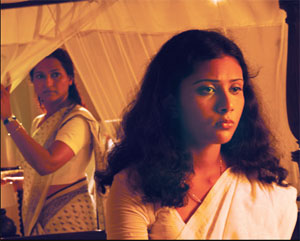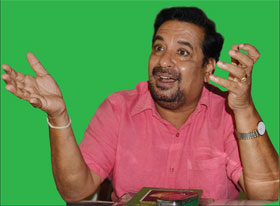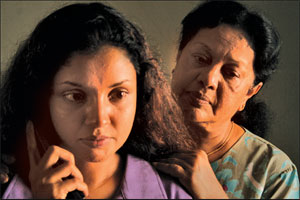|

Diverse inspirations, captivating intents!
Channa Bandara WIJEKOON
Bennett Rathnayake was born in Matale. He came to Colombo in his
youth with the ambition of becoming a film director. He took a
stepping-stone by directing a series of teledramas which brought him
recognition.
|

Aswe Ira Handa Yata |
|

Aswesuma |
Bennett's debut film Aswesuma (The Compensation) was acclaimed
locally and internationally. His next productions Sulanga (The Wind) and
Ira Handa Yata (Under the Moon and Stars) too followed suit. The award
winning director shared his views in regard to teledramas, films and the
anticipated future trends in local cinema with Daily News Projector.
Q: How were you inspired to become an artiste?
A: While in school, I used to direct small dramas with friends
and stage them in the monthly literary society gatherings. Inspiration
came from there.
I loved to read folktales. A gentleman called Wijesinghe at the
library encouraged me to read translations of Russian, British and
Chinese novels. I also read novels of Gunadasa Amarasekera, K
Jayathilleke (Pls check the spelling) and Martin Wickramasinghe. Reading
books inculcated rich imaginations in my mind. I used to travel to
Colombo and see films and stage dramas during my youth. I aspired to
become a film-maker one day.
Q: How did you enter the national platform?
A: I had a huge urge to learn the finer points in film
directing. I followed a course in cinematography at the OCIC in 1986.
Later I wrote the script and directed a short video film called 'Piyawaru
Saha Puththu.' Elson Divithuragama and Leena De Silva were casted for
the main roles and I too acted in the production. It was chosen as the
best presentation by the OCIC panel.
Recognition of the OCIC award paved way for the film to be telecast
over Rupavahini and ITN. It was shown in prime-time belts. My name was
publicized during the event. I directed a five-episode teledrama called
'Sayuren Eha.' Linton Semage was included in the cast. I did another
production called 'Tharu'. The story revolved around a theatre actress
who conquered cinema. It was telecast over MTV. This was followed with a
range of my teledrama directions. In 1994 we launched our television
production house, Benn Films.
|

Sulanga |
Q: Most of your latter teledramas embody cinematic attributes.
Have you inserted these features on purpose?
A: Yes. I used the teledrama medium to do all my experiments
before directing a film. I experimented in shooting long scenes without
dialogues, yet keeping the audience intact. My latest teledrama is
'Romeo and Dante' based on 'Count of Monte Cristo'. It is my ninth
teledrama and it will most likely be the last one.
I did my maiden film creation 'Aswesuma' in 2000. I wrote the script
and directed the film. The film was well received by the local audience
and clinched many awards at local film festivals. It was acclaimed at
international film festivals.
Q: The cinematography in 'Aswesuma' was on par with films made
by seasoned film directors.
A: That is because I let loose all my know-how at that time
into the creation. That was a result of years of experiment. Usually the
first film by many directors makes such an impact. Joe Abeywickrama
walking on a rapid pace across a paddy field in a village and crossing a
hanging bridge to enter a new world shows the burning desire dwelled
within me to become a film director. 'Aswesuma' brought vast recognition
to me. 'Aswesuma' enhanced this effect. It received two international
awards and a Sarasaviya award.
Q: 'Ira Handa Yata' was your vision about the separatist war.
A lot of criticism was aimed at the film.
A: There is a 'war-film culture' in the cinema world. There
are various categories. A film like 'Saving Private Ryan' had many
emotional aspects. I did 'Ira Handa Yata' in 2009. I wanted to insert my
own philosophy about the separatist struggles into my film. The film was
recognized at international film festivals in Los Angeles and Italy.
|

Bennett Rathnayake. Picture by Chaminda Niroshana |
I have seen the 1983 July riots and have experienced the bitter
struggle which prevailed for three decades in our country. Love and
compassion was a far cry from the environment that was present during
that era. People were yearning for peace because they were at the
receiving end of the situation. It is high time we learned to call
ourselves Sri Lankans. All our relationships are hampered by race, caste
and dogmas. I wanted to have a dialogue in line with these aspects in my
film. Some critics were only concerned about my son being casted in the
film.
Q: What do you think of film criticism?
A: It is a vital aspect in nurturing the quality of films.
However, critics should know their basics before venturing into
criticism. There should be standards for film criticism or for any piece
of art for that matter. Budding local film critics should read works of
Gamini Weragama.
A film critic must have a wide exposure to the current world trends
and history about cinema. He or she must be a well read person and must
constantly update himself or herself. Any man geared with a pen cannot
be a film critic. Even a world renowned film maker had once commented
that "Some critics are like slaughters that come to gun down the wounded
soldiers after a battle well fought".
Q: Relate some of your experiences of directing Joe
Abeywickrama.
A: He is a top class and a disciplined actor who did not treat
me as a newcomer. He read the 'Aswesuma' script and made some
suggestions regarding his character.
He enquired whether he could perform a particular scene only with
expressions, without delivering dialogues in the script. Many a time I
let him bring his creativity into the scenes in his own unique manner.
Q: What are your suggestions to uplift local cinema?
A: Cinema is an entertainment medium. It is also an industry.
We had a healthy film culture in the 1960s and 70s.
Seeing a film was a family outing during our childhood. The unrest
situation in the country due to terrorism brought a blockade for this
trend.
During 1983 riots, many cinema halls were destroyed. The downfall in
the industry was triggered. This decline was further fuelled by inferior
quality sex films and low budget comedy films. The quality of films too
deteriorated.
Now there is peace in the country. Making hi-tech mini cinema halls
with all facilities would facilitate cinemagoers.
The North and East market is now open. Thus the distribution network
should be enhanced. We must bring new technology to cinema.
Tax concessions given by the government is good. Concessions should
also be granted for advertising. Television channels could be used to
provide publicity for cinema in a much greater and effective manner.
We must have an acceptable norm and methodology of screening films
and the National Film Corporation is responsible for this. The public
censor board should standardize films apart from approving them. 'Good
films' and 'not-so-good' films should not be kept in the same queue.
We need film archives to preserve our films. It is a secondary data
of our history. Dr Lester James Peries had been requesting this for many
years.
Q: What will be your next film?
A: It is a story revolving around some significant events took
place in our country between the 1910 and 1948 period.
I am doing a research for the film script these days with Sugath
Ratagedera.
Digital technology will be adapted for the film and it will be made
to international standards. The film will be a pleasant experience for
the local movie buffs.
[email protected]
Not just another film festival
[SAARC Film Festival]
Ishara JAYAWARDANE
[Film schedule]
* May 16 :
10 am - My Mother tongue (Bangladesh - documentary)
1 pm - Red Building Where the Sun Sets (India - documentary)
2 pm - To be announced (Sri Lanka - documentary) 5.30 pm - Inauguration
6.30 pm - Byari (India - feature)
* May 17 :
10 am - The Historic Speech of the 7th March (Bangladesh - documentary)
11.30 am - Ane We Play On (India - documentary) 1.30 pm - Saving Face
(Pakistan - documentary) 3.30 pm - Sazaa (Maldives - feature) 6 pm - Bol
(Pakistan - feature)
* May 18 :
9 am to 1.30 pm - Film vs Digital workshop 3 pm - Akasa Kusum (Sri Lanka
- feature) 6.30 pm - Khelaghor (Bangladesh - feature)
* May 19 :
10 am - To be announced (Sri Lanka - documentary) 1 pm - Ranjan Ami Ar
Ashbo Na (India - feature) 3 pm - Ram Chand Pakistani (Pakistan -
feature) 6.30 pm - Loodhifa (Maldives - feature)
* May 20 :
10 am - Priyotomeshu (Bangladesh - feature) 1 pm - Vidhu
(Sri Lanka - feature) 6.30 pm Awards ceremony
Sri Lanka's time certainly has come at last with the country going
through a transformation in the field of arts. Now more than ever before
Sri Lanka is the place to be in with so many exciting things happening
in the island.
|

A movie which will unfurl at the event |
The SAARC Cultural Centre is gearing up to launch a Film Festival
from May 16 to 20 at the National Film Corporation.
"The event is not just a film festival. We have an artistes camp,
there is a research component, there are publications regularly coming
out, conferences and workshops. This film festival is one of the many
events that the SAARC Cultural Centre is organizing in order to promote
culture and bring together the members of the SAARC countries by
promoting culture. Fostering arts and culture is merely a tool whereby
we bring together the countries. There is more bonding and unity and we
are basically celebrating the cultural heritage we share as a region
together," SAARC Cultural Centre Deputy Director of Programmes Soundarie
David Rodrigo commented about the event.
She recalled that the first SAARC Film Festival was held in 201. It
was a huge success.
"We had films from Bhutan, India, Pakistan and Sri Lanka last year.
Since it is a SAARC event, there is a lot of protocol involved.
Governments nominate the films that are to be screened at the film
festival. This will be a feature and a documentary film festival," she
said.
It would be a great experience indeed for anyone who is a lover of
true art films. As Soundarie states all these nominations are not the
typical commercial films.
They are serious films with a message. "There will be adjudicators
coming from non SAARC countries such as Singapore, Russia and Iran. So
they will be judging the best feature film and the best documentary.
We will be having a silver and bronze medal going out. The directors
of some of the movies will also be in attendance. Audiences can expect a
rich and thought provoking series of films that will showcase the film
industry of the region,' she said.
Speaking about the artistes camp which will be happening from June 7
to 10 Soundarie said, "So far we have got confirmation from Afghanistan,
Maldives, Bangladesh and India. There you will see top caliber artists
at work.
We have a governing board which consists of representatives from the
SAARC region but the National Film Corporation as well as the Iranian
and Russian Embassy are sponsoring the adjudicators for the film
festival. The Bank of Ceylon has also been a supporter of the event.
Our director G L W Samarasinghe has guided us in all these
activities. We plan to have the SAARC Film Festival as an annual event.
We will also be having a workshop on May 18 as part of the festival.
It is open for the film directors and invitees."
Speaking to the Daily News SAARC Cultural Centre Director G L W
Samarasinghe said, "We are hoping to showcase an excellent film
festival. This will be a great event for South Asia in the future. In
some countries film industry is a little weak. So we can't expect films
from Maldives and Nepal. Even in the case of Afghanistan it is very
difficult to get some participation from them. We can hope to get some
very good films from India, Pakistan and Bangladesh. This will be a good
experience for Sri Lankans."
For more information about the event visit www.saarcculture.org
Higher Diploma Course in film direction
The Higher Diploma Course in Film Direction conducted by the Sri
Lanka Television Training Institute will commence on June 23. Students
who are interested in applying for this two year course can send their
applications to the Sri Lanka Television Training Institute. No. 100A,
Sri Lanka Foundation Mawatha, Colombo 7 before May 31.
The course content will cover all subjects directly and indirectly
connected to cinema: the history of cinema, scripting, cinematography,
editing, acting, production designing, production planning, lyric
writing, film music, art direction, make-up, movie criticism and
appreciation etc. The aim of this course will be to set a new trend in
Sri Lankan cinematic creation for the new generation.
Enoka Sathyangani Keerthinanda will be the course director. M D
Mahindapala, Prasanna Vithanage, Vimukthi Jayasundara, Vishvanath
Buddhika Keerthisena, Jayanatha Chandrasiri, Prasanna Jayakody, Pravin
Jayarathne, Udara Palliyaguruge and Saminda Ranawake make up the panel
of lecturers. Practical sessions and workshops will be conducted
throughout the period. |



